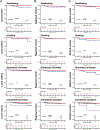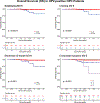Dysphagia and shortness-of-breath as markers for treatment failure and survival in oropharyngeal cancer after radiation
- PMID: 36640945
- PMCID: PMC10023381
- DOI: 10.1016/j.radonc.2023.109465
Dysphagia and shortness-of-breath as markers for treatment failure and survival in oropharyngeal cancer after radiation
Abstract
Background: Post-treatment symptoms are a focal point of follow-up visits for head and neck cancer patients. While symptoms such as dysphagia and shortness-of-breath early after treatment may motivate additional work up, their precise association with disease control and survival outcomes is not well established.
Methods: This prospective data cohort study of 470 oropharyngeal cancer patients analyzed patient-reported swallowing, choking and shortness-of-breath symptoms at 3-to-6 months following radiotherapy to evaluate their association with overall survival and disease control. Associations between the presence of moderate-to-severe swallowing, choking and mild-to-severe shortness-of-breath and treatment outcomes were analyzed via Cox regression and Kaplan-Meier. The main outcome was overall survival (OS), and the secondary outcomes were local, regional, and distant disease control.
Results: The majority of patients (91.3%) were HPV-positive. Median follow-up time was 31.7 months (IQR: 21.9-42.1). Univariable analysis showed significant associations between OS and all three symptoms of swallowing, choking, and shortness-of-breath. A composite variable integrating scores of all three symptoms was significantly associated with OS on multivariable Cox regression (p = 0.0018). Additionally, this composite symptom score showed the best predictive value for OS (c-index = 0.75). Multivariable analysis also revealed that the composite score was significantly associated with local (p = 0.044) and distant (p = 0.035) recurrence/progression. Notably, the same significant associations with OS were seen for HPV-positive only subset analysis (p < 0.01 for all symptoms).
Conclusions: Quantitative patient-reported measures of dysphagia and shortness-of-breath 3-to-6 months post-treatment are significant predictors of OS and disease recurrence/progression in OPC patients and in HPV-positive OPC only.
Keywords: Dysphagia; HPV; Oropharyngeal cancer; Post-treatment symptoms; Treatment failure.
Published by Elsevier B.V.
Figures



References
-
- Siegel RL, Miller KD & Jemal A Cancer statistics, 2020. CA. Cancer J. Clin. 70, 7–30 (2020). - PubMed
-
- Licitra L et al. High-risk human papillomavirus affects prognosis in patients with surgically treated oropharyngeal squamous cell carcinoma. J. Clin. Oncol. 24, 5630–5636 (2006). - PubMed
-
- Sedaghat AR et al. Prognostic significance of human papillomavirus in oropharyngeal squamous cell carcinomas. Laryngoscope 119, 1542–1549 (2009). - PubMed
Publication types
MeSH terms
Grants and funding
LinkOut - more resources
Full Text Sources
Medical

